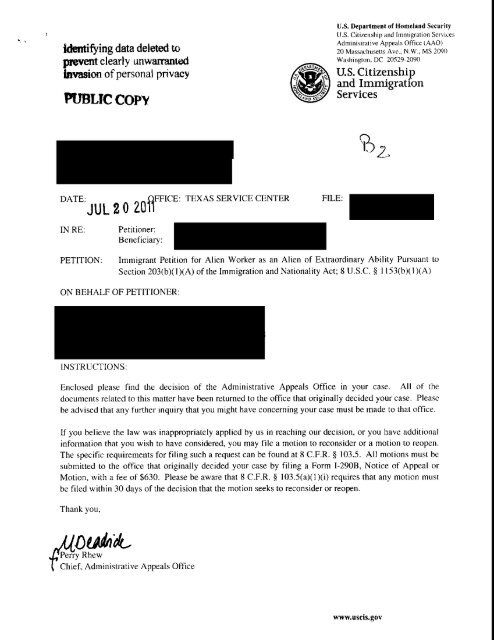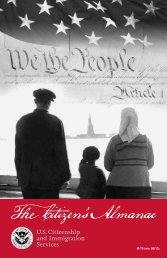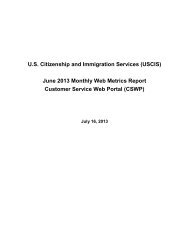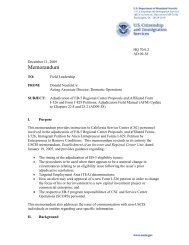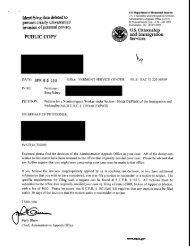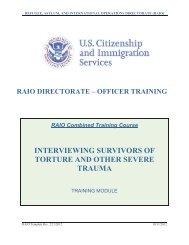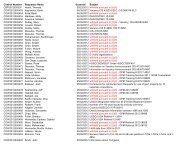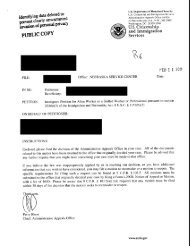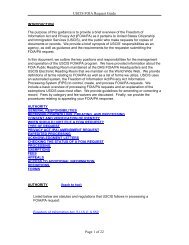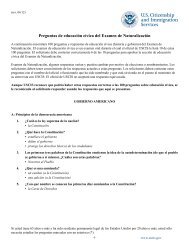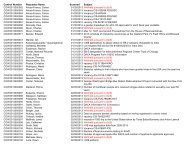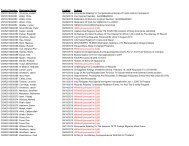~DtJitltk., - uscis
~DtJitltk., - uscis
~DtJitltk., - uscis
You also want an ePaper? Increase the reach of your titles
YUMPU automatically turns print PDFs into web optimized ePapers that Google loves.
Page 2<br />
DISCUSSION: The employment-based immigrant visa petition was denied by the Director, Texas<br />
Service Center, on January 21, 2010, and is now before the Administrative Appeals Office (AAO)<br />
on appeal. The appeal will be dismissed.<br />
The petitioner seeks to classify the beneficiary as an employment-based immigrant pursuant to<br />
section 203(b)(1)(A) of the Immigration and Nationality Act (the Act), 8 U.S.C. § 1153(b)(l)(A),<br />
as an alien of extraordinary ability. The director determined that the petitioner had not<br />
established the requisite extraordinary ability and failed to submit extensive documentation of<br />
the beneficiary's sustained national or international acclaim.<br />
Congress set a very high benchmark for aliens of extraordinary ability by requiring through the<br />
statute that the petitioner demonstrate the beneficiary's "sustained national or international<br />
acclaim" and present "extensive documentation" of his or her achievements. See section<br />
203(b)(l)(A)(i) of the Act and 8 C.F.R. § 204.5(h)(3). The implementing regulation at 8 C.F.R.<br />
§ 204.5(h)(3) states that an alien can establish sustained national or international acclaim through<br />
evidence of a one-time achievement, specifically a major, internationally recognized award.<br />
Absent the receipt of such an award, the regulation outlines ten categories of specific evidence.<br />
8 C.F.R. §§ 204.5(h)(3)(i) through (x). The petitioner must submit qualifying evidence under at<br />
least three of the ten regulatory categories of evidence to establish the basic eligibility<br />
requirements.<br />
On appeal, counsel claims that the beneficiary meets at least three of the regulatory criteria at 8<br />
C.F.R. § 204.5(h)(3).<br />
I. Law<br />
Section 203(b) of the Act states, in pertinent part, that:<br />
(1) Priority workers. -- Visas shall first be made available ... to qualified<br />
immigrants who are aliens described in any of the following subparagraphs (A)<br />
through (C):<br />
(A) Aliens with extraordinary ability. -- An alien is described in this<br />
subparagraph if --<br />
(i) the alien has extraordinary ability in the sciences,<br />
arts, education, business, or athletics which has been<br />
demonstrated by sustained national or international<br />
acclaim and whose achievements have been<br />
recognized in the field through extensive<br />
documentation,<br />
(ii) the alien seeks to enter the United States to<br />
continue work in the area of extraordinary ability, and
(iii) the alien's entry into the United States will<br />
substantially benefit prospectively the United States.<br />
U.S. Citizenship and Immigration Services (USClS) and legacy Immigration and Naturalization<br />
Service (INS) have consistently recognized that Congress intended to set a very high standard for<br />
individuals seeking immigrant visas as aliens of extraordinary ability. See H.R. 723 IOl st Cong., 2d<br />
Sess. 59 (1990); 56 Fed. Reg. 60897, 60898-99 (Nov. 29,1991). The term "extraordinary ability"<br />
refers only to those individuals in that small percentage who have risen to the very top of the<br />
field of endeavor. [d. and 8 C.F.R. § 204.5(h)(2).<br />
The regulation at 8 C.F.R. § 204.5(h)(3) requires that the petitioner demonstrate the beneficiary's<br />
sustained acclaim and the recognition of his or her achievements in the field. Such acclaim must be<br />
established either through evidence of a one-time achievement (that is, a major, international<br />
recognized award) or through the submission of qualifying evidence under at least three of the<br />
following ten categories of evidence.<br />
(i) Documentation of the alien's receipt of lesser nationally or internationally<br />
recognized prizes or awards for excellence in the field of endeavor;<br />
(ii) Documentation of the alien's membership in associations in the field for which<br />
classification is sought, which require outstanding achievements of their members,<br />
as judged by recognized national or international experts in their disciplines or<br />
fields;<br />
(iii) Published material about the alien in professional or major trade publications or<br />
other major media, relating to the alien's work in the field for which classification is<br />
sought. Such evidence shall include the title, date, and author of the material, and<br />
any necessary translation;<br />
(iv) Evidence of the alien's participation, either individually or on a panel, as a judge<br />
of the work of others in the same or an allied field of specialization for which<br />
classification is sought;<br />
(v) Evidence of the alien's original scientific, scholarly, artistic, athletic, or businessrelated<br />
contributions of major significance in the field;<br />
(vi) Evidence of the alien's authorship of scholarly articles m the field, Jn<br />
professional or major trade publications or other major media;<br />
(vii) Evidence of the display of the alien's work in the field at artistic exhibitions or<br />
showcases;<br />
(viii) Evidence that the alien has performed in a leading or critical role for<br />
organizations or establishments that have a distinguished reputation;
Page 4<br />
(ix) Evidence that the alien has commanded a high salary or other significantly high<br />
remuneration for services, in relation to others in the field; or<br />
(x) Evidence of commercial successes in the performing arts, as shown by box office<br />
receipts or record, cassette, compact disk, or video sales.<br />
In 2010, the U.S. Court of Appeals for the Ninth Circuit (Ninth Circuit) reviewed the denial of a<br />
petition filed under this classification. Kazarian v. USc/S, 596 F.3d I I 15 (9th Cir. 2010). Although<br />
the court upheld the AAO's decision to deny the petition, the court took issue with the AAO's<br />
evaluation of evidence submitted to meet a given evidentiary criterion. I With respect to the criteria<br />
at 8 CF.R. §§ 204.5(h)(3)(iv) and (vi), the court concluded that while USCIS may have raised<br />
legitimate concerns about the significance of the evidence submitted to meet those two criteria,<br />
those concerns should have been raised in a subsequent "final merits determination." Id.<br />
The court stated that the AAO's evaluation rested on an improper understanding of the regulations.<br />
Instead of parsing the significance of evidence as part of the initial inquiry, the court stated that "the<br />
proper procedure is to count the types of evidence provided (which the AAO did)," and if the<br />
petitioner failed to submit sufficient evidence, "the proper conclusion is that the applicant has failed<br />
to satisfy the regulatory requirement of three types of evidence (as the AAO concluded)." Id. at<br />
1122 (citing to 8 CF.R. § 204.5(h)(3)). The court also explained the "final merits determination" as<br />
the corollary to this procedure:<br />
Id. at I 119.<br />
If a petitioner has submitted the requisite evidence, USCIS determines whether the<br />
evidence demonstrates both a "level of expertise indicating that the individual is one<br />
of that small percentage who have risen to the very top of therirl field of endeavor,"<br />
8 CF.R. § 204.5(h)(2), and "that the alien has sustained national or international<br />
acclaim and that his or her achievements have been recognized in the field of<br />
expertise." 8 CF.R. § 204.5(h)(3). Only aliens whose achievements have garnered<br />
"sustained national or international acclaim" are eligible for an "extraordinary<br />
ability" visa. 8 U.S.C § 1153(b)(l)(A)(i).<br />
Thus, Kazarian sets forth a two-part approach where the evidence is first counted and then<br />
considered in the context of a final merits determination. In reviewing Service Center decisions, the<br />
AAO will apply the test set forth in Kazarian. As the AAO maintains de novo review, the AAO<br />
will conduct a new analysis if the director reached his or her conclusion by using a one-step analysis<br />
rather than the two-step analysis dictated by the Kazarian court. See Spencer Enterprises, Inc. v.<br />
United States, 229 F. Supp. 2d 1025, 1043 (E.D. Cal. 2001), affd, 345 F.3d 683 (9 th Cir. 2003);<br />
see also Soltane v. DOl, 381 FJd 143, 145 (3d Cir. 2004) (noting that the AAO conducts<br />
appellate review on a de novo basis).<br />
I Specifically, the court stated that the AAO had unilaterally imposed novel, substantive, or evidentiary requirements<br />
beyond those set forth in the regulations at 8 C.F.R. § 204.5(h)(3)(iv) and 8 c.F.R. § 204.5(h)(3)(vi).
Page 9<br />
from websites regarding the Latinbiz Awards indicating that they honor "outstanding women in<br />
South Florida's " the documentary evidence submitted by the petitioner<br />
reflects are limited to the South Florida community and are not<br />
reflective of nationally or internationally recognized prizes or awards for excellence in the field.<br />
There is no evidence demonstrating that the Latinbiz Awards are recognized beyond the South<br />
Florida community.<br />
Further, at the time of the original filing of the petItIOn, counsel argued the beneficiary's<br />
eligibility for this criterion based on the Proctor and Gamble award and stated:<br />
September 28, 1993 Proctor and Gamble Certificate awarded to [the beneficiary]<br />
for achieving the "Excellency Challenge" awarded for her remarkable<br />
performance as a student ... and information on the award. The "Excellency<br />
Challenge" award is presented each year to the top 40 students from the most<br />
prestigious Venezuelan Universities.<br />
The petitioner submitted a certificate reflecting that the beneficiary was awarded the Excellency<br />
Challenge and screenshots from htlp:llpg.newsware.net indicating that the program "recognizes<br />
students with excellent academic performance, innitiative I sici, and leadership skills." The AAO<br />
notes that the petitioner submitted several screenshots in a foreign language without any English<br />
language translations as required by the regulation at 8 C.F.R. § 103.2(b)(3). Notwithstanding,<br />
academic study is not a field of endeavor, but training for a future field of endeavor. As such,<br />
academic scholarships, student awards, postdoctoral fellowships, and financial aid awards cannot<br />
be considered nationally or internationally recognized prizes or awards in the beneficiary's field<br />
of endeavor. The documentary evidence submitted by the petitioner fails to establish that the<br />
beneficiary's academic award is a nationally or internationally recognized prize or award for<br />
excellence in the field. Moreover, the petitioner failed to submit any documentary evidence<br />
beyond to demonstrate that the academic award is recognized nationally or<br />
Bonus Almentacion won an award, let alone a nationally or internationally recognized award for<br />
excellence in the field. The unsupported statements of counsel on appeal or in a motion are not<br />
evidence and thus are not entitled to any evidentiary weight. See INS v. Phinpathya, 464 U.S.<br />
183,188-89 n.6 (1984).<br />
The AAO notes here that on appeal counsel indicated in a footnote:<br />
I The beneficiary's I marketing/advertising carnparg:n<br />
was nominated for<br />
(Unfortunately, the evidence reflecting this<br />
Promax awards is the highest accolade for promotion and marketing professionals<br />
for any given year, and the BOA award is the ultimate accolade for outstanding<br />
design in media.<br />
Again, counsel failed to support her assertions regarding the beneficiary's nominations for the<br />
Promax and BOA awards with documentary evidence. Nevertheless, even if the beneficiary was<br />
nominated for a Promax and BOA award, counsel failed to demonstrate that such nominations<br />
equate to nationally or internationally recognized prizes or awards for excellence in the field.<br />
As discussed, the plain language of this regulatory criterion specifically requires that the<br />
beneficiary receive prizes or awards and that they be nationally or internationally recognized for<br />
excellence in her field. The burden is on the petitioner to meet every element of this criterion.<br />
In this case, the petitioner failed to demonstrate that the beneficiary has received any nationally<br />
or internationall y recognized prizes or awards for excellence in her field of endeavor consistent<br />
with the plain language of the regulation at 8 C.F.R. § 204.S(h)(3)(i).<br />
Accordingly, the petitioner failed to establish that the beneficiary meets this criterion.<br />
Documentation of the alien's membership in associations in the field for which<br />
classification is sought, which require outstanding achievements of their<br />
members, as judged by recognized national or international experts in their<br />
disciplines or fields.<br />
In the director's decision, he found that the petJtlOner failed to establish the beneficiary's<br />
eligibility for this criterion. At the time of the original filing of the petition, counsel claimed the<br />
beneficiary's eligibility based on membership with The Com Vort Group, the eMarketing<br />
Association, and the Public Relations Society of America (PRSA). Although on appeal counsel<br />
only addressed membership with The ComVort Group, the AAO will also address the<br />
beneficiary's membership with the eMarketing Association and the PRSA.<br />
The plain language of the regulation at 8 C.F.R. § 204.S(h)(3)(ii) requires "ldlocumentation or<br />
the alien's membership in associations in the field for which is classification is sought, which<br />
require outstanding achievements of their members, as judged by recognized national or<br />
international experts in their disciplines or fields." In order to demonstrate that membership in<br />
an association meets this criterion, a petitioner must show that the association requires
Page 13<br />
The officer found that [the beneficiary 1 did not meet the printed press and media<br />
criteria, as the articles submitted were not primarily about the beneficiary.<br />
Rather, they were about her advertising/marketing campaigns and provided quotes<br />
from [the beneficiary 1 describing her basis for same. As such, there articles<br />
reveal I the beneficiary's 1 extraordinary ability in marketing/advertising.<br />
The plain language of the regulation at 8 C.F.R. § 204.5(h)(3 )(iii) requires "[p lublished material<br />
about the alien in professional or major trade publications or other major media, relating to the<br />
alien's work in the field for which classification is sought." In general, in order for published<br />
material to meet this criterion, it must be primarily about the beneficiary and, as stated in the<br />
regulations, be printed in professional or major trade publications or other major media. To qualify<br />
as major media, the publication should have significant national or international distribution. Some<br />
newspapers, such as the New York Times, nominally serve a particular locality but would qualify as<br />
major media because of significant national distribution, unlike small local community papers. 4<br />
Furthermore, the plain language of the regulation at 8 C.F.R. § 204.5(h)(3)(iii) requires that<br />
"[ s luch evidence shall include the title, date, and author of the material, and any necessary<br />
translation."<br />
A review of the record of proceeding reflects that the petitioner submitted the following<br />
documentation:<br />
1.<br />
2.<br />
3.<br />
An article entitled,<br />
Producto;<br />
An article on';"0,,1<br />
author, Producto;<br />
A screenshot entitled,<br />
unidentified author, www.producto.com;<br />
June 1998, unidentified author,<br />
4. A screenshot entitled,<br />
September 2001, unidentified author, www.producto.com;<br />
unidentified date, unidentified<br />
unidentified date,<br />
5. November 22, 1999,<br />
6.<br />
March 2002, unidentified author, Publicidad & Mercadeo;<br />
4 Even with nationally-circulated newspapers, consideration must be given to the placement of the article. f-or<br />
example, an article that appears in the Washington Post, but in a section that is distributed only in Fairfax County.<br />
Virginia, for instance. cannot serve to spread an individual's reputation outside of that county.
Page 14<br />
7. An article entitled, October 2009,<br />
unidentified author, Publicidad & Mercadeo;<br />
8. October 18, 2009,_<br />
9. A snippet entitled,<br />
unidentified source; and<br />
10. Several articles from Creativity in June 2009.<br />
unidentified date, unidentified author,<br />
Regarding items I and 2, the petitioner failed to include the date and/or author of the material<br />
pursuant to the regulation at 8 C.F.R. § 204.5(h)(3)(iii). Moreover, a review of the articles fails<br />
to reflect that they are published material about the beneficiary relating to her work. In fact,<br />
regarding item I, the article is about numerous advertisements in soccer. Although the<br />
beneficiary was quoted one time in the article, it is clearly not about the beneficiary relating to<br />
her work. Regarding item 2, the article is and the<br />
beneficiary is never mentioned in the article. As such, the article is not about the beneficiary<br />
relating to her work. Further, the petitioner failed to submit any documentary evidence<br />
establishing that _ is a professional or major trade publication or other major media.<br />
Regarding items 3 and 4, the petitioner failed to include the date and/or author of the material<br />
pursuant to the regulation at 8 c.F.R. § 204.5(h)(3)(iii). Regarding item 3, the screenshot is<br />
about the history of rather than the beneficiary relating to her work. In fact, the<br />
beneficiary is not even mentioned in the screenshot. Likewise, regarding item 4, the screenshot<br />
is about companies advertising in sports. There is no mention of the beneficiary in the<br />
screenshot. Regardless, the petitioner failed to submit any documentary evidence demonstrating<br />
that is a professional or major trade publication or other major media. The<br />
AAO is not persuaded that articles posted on the Internet from a printed publication are<br />
automatically considered major media. In today's world, many newspapers and media outlets,<br />
regardless of size and distribution, post at least some of their stories on the Internet. To ignore<br />
this reality would be to render the "major media" requirement meaningless. However, the AAO<br />
is not persuaded that international accessibility by itself is a realistic indicator of whether a given<br />
website is "major media."<br />
Regarding item 5, the petitioner failed to include the author of the article pursuant to the<br />
regulation at 8 C.F.R. § 204.5(h)(3)(iii). Further, although the beneficiary is mentioned one time<br />
as one of the moderators of the London Festival, the article is not about the beneficiary relating<br />
to her work. In addition, the petitioner submitted screenshots from Wikipedia regarding EI<br />
Nacional. However, as there are no assurances about the reliability of the content from this<br />
open, user-edited Internet site, the AAO will not assign weight to information from Wikipedia.
Page 15<br />
See Laamilem Badasa v. Michael Mukasey, 540 F.3d 909 (8 th Cir. 2008).5 The petitioner failed<br />
to submit any other documentary evidence regarding El Nacional, so as to establish that it is a<br />
professional or major trade publication or other major media.<br />
Regarding items 6 and 7, the petitioner failed to include the authors of the material pursuant to<br />
the regulation at 8 C.F.R. § 204.5(h)(3)(iii). Moreover, regarding item 6, the article is about the<br />
new campaign image of El Nacional. While the beneficiary is quoted one time in the article, the<br />
article is not about the beneficiary relating to her work. Regarding item 7, the article is about the<br />
Electronic Benefits Transfer Card rather than the beneficiary relating to her work. In fact, the<br />
beneficiary is not even mentioned in the article. Articles that are not about the beneficiary do not<br />
meet this regulatory criterion. See, e.g., Accord Negro-Plumpe v. Okin,2:07-CV-820-ECR-RJJ<br />
at 7 (D. Nev. Sept. 8, 2008) (upholding a finding that articles about a show are not about the<br />
actor). In addition, while the petitioner submitted a screenshot from Publicidad & Mercadeo's<br />
website, the petitioner failed to submit any independent, objective evidence regarding Puhlicidad<br />
& Mercadeo. Furthermore, while the petitioner highlighted that Publicidad & Mercadeo has a<br />
"[mlonthly circulation and is present at on national scale," the AAO is not persuaded that such<br />
claims are consistent with a professional or major trade publication or other major media.<br />
Regarding item 8, the blog is about various issues and announcements including the posting that<br />
the beneficiary was awarded However, the blog is not about the<br />
beneficiary relating to her work. In addition, the petitioner submitted screenshots from<br />
Wikipedia regarding El Universal. However, the petitioner failed to submit any documentary<br />
evidence demonstrating that llllp:l/blogs.eluniversal.com is a professional or major trade<br />
publication or other major media.<br />
Regarding item 9, the petitioner failed to include the date and author of the material pursuant to<br />
the regulation at 8 C.F.R. § 204.5(h)(3 )(iii). Further, while the snippet indicates that the<br />
advertisement campaign was developed by Plan B*, there is no mention of the beneficiary. As<br />
such, the snippet is not published material about the beneficiary relating to her work. Also, the<br />
petitioner failed to indicate where the snippet was published, so as to demonstrate that is was<br />
published in a professional or major trade publication or other major media.<br />
5 See also the online content from http://co.wikipedia.org/wikiM'ikipedia: General disclaimer, accessed on July 5.<br />
20 I I, and copy incorporated into the record of proceeding is subject to the following general disclaimer:<br />
WIKIPEDIA MAKES NO GUARANTEE OF VALIDITY. Wikipedia is an online open-content<br />
collaborative encyclopedia, that is, a voluntary association of individuals and groups working to<br />
develop a common resource of human knowledge. The structure of the project allows anyone<br />
with an Internet connection to alter its content. Please be advised that nothing found here has<br />
necessarily been reviewed by people with the expertise required to provide you with complete,<br />
accurate or reliable information. . .. Wikipedia cannot guarantee the validity of the information<br />
found here. The content of any given article may recently have been changed, vandalized or<br />
altered by someone whose opinion does not correspond with the state of knowledge in the relevant<br />
fields.
Page 16<br />
Regarding item 10, as indicated above, the petitioner submitted several articles from Creativity.<br />
Notwithstanding that the petitioner failed to indicate the publication date of Creativity and the<br />
authors of the articles, a review of the article fails to mention the beneficiary and are not<br />
published material about the beneficiary relating to her work. In addition, the petitioner failed to<br />
submit any documentary evidence establishing that Creativity is a professional or major trade<br />
publication or other major media.<br />
With the exception of item 8, the petitioner failed to include the date and/or author for any of the<br />
submitted documentation pursuant to the regulation at 8 C.P.R. § 204.5(h)(3)(iii). Moreover, the<br />
petitioner failed to demonstrate that any of the documentary evidence reflected published<br />
material about the beneficiary relating to her work. Finally, the petitioner failed to establish that<br />
the material was published in professional or major trade publications or other major media.<br />
Accordingly, the petitioner failed to establish that the beneficiary meets this criterion.<br />
Evidence of the alien's participation, either individually or on a panel, as a judge of<br />
the work of others in the same or an allied field of specification for which<br />
classification is sought.<br />
In the director's decision, he found that the petitioner failed to establish the beneficiary's<br />
A review of the record of prclceedin reflects that the petitioner<br />
stated:<br />
In name of the IESA Entrepreneurs Centre and the academic team of the Program<br />
for Entrepreneurs of the IESA, we want to once more thank to [the petitioner 1<br />
and, specially, you for your valuable contribution to the 2006 and 2007 editions of<br />
this Program.<br />
Your habitual presence as a jury in the selection of the best business plans<br />
elaborated by the participants of this program, as well as the prize that your ad<br />
agency has given to some of the future entrepreneurs by giving them a free<br />
consulting of marketing and image for six months, are invaluable contributions to<br />
the stimulation of successful entrepreneurial activity in Venuzuela.<br />
As you know, the Entrepreneurs Centre of the IESA organizes this program with<br />
the objective of offering tools to create business plans and to impulse the success<br />
of new Venezuelan businesses.<br />
In addition, the petitioner submitted a screenshot from IESA's website indicating that "IESA<br />
trains managers in social responsibility, entrepreneurship, and community leadership on an equal<br />
footing to quality standards applied by top management schools." The AAO notes that the
Page 17<br />
petitioner also submitted foreign language documents without any English language translations<br />
as required by the regulation at 8 c.F.R. § 103.2(b)(3).<br />
The plain language of the regulation at 8 C.F.R. § 204.5(h)(3)(iv) requires "[e]vidence of the<br />
alien's participation, either individually or on a panel, as a judge of the work of others in the same<br />
or an allied . which classification is sought [emphasis added]." Although the<br />
letter from indicated that the beneficiary served as a jury member, the<br />
petitioner failed to demonstrate that the beneficiary's service "in the selection of the best<br />
business plans elaborated by the participants of this program" is in the same or an allied field of<br />
specification for which classification is sought. The petitioner's field of expertise is in<br />
advertising and marketing. However, the letter from fails to indicate that<br />
the beneficiary served as a judge of the work of others in her field. There is insufficient<br />
information demonstrating that selecting business plans is in the same or an allied field of<br />
specification in the beneficiary's field of advertising and marketing.<br />
The petitioner submitted a letter from Executive Director of the<br />
Venezuelan Federation of Advertising Agencies (FEV AP) who stated:<br />
I The beneficiary 1 . participated as a ponent [sic J in the event<br />
1999 edition." She participated in the<br />
a yearl y advertising event of the [FEV AP], with the<br />
only objective of contributing to the professional development of the new<br />
generations.<br />
The petitioner also submitted documentary evidence regarding background information about<br />
"Creative Storm 99," including foreign language documents without any English language<br />
translations as required by the regulation at 8 C.F.R. § 103.2(b)(3). While the letter from<br />
FEV AP indicates that the beneficiary participated and "Advertising in the<br />
New Millennium," there is no indication that the as a judge of the work<br />
of others. In fact, it appears from the foreign language documentation that the beneficiary was a<br />
speaker at Moreover, the record fails to reflect that a "ponent" equates to a<br />
As such, the petitioner failed to demonstrate that the beneficiary's participation at<br />
and "Advertising in the New Millennium" meets the plain language of the<br />
regulation at 8 C.F.R. § 204.5(h)(3)(iv).<br />
The petitioner submitted a letter addressed to the beneficiary from_, Partner at Brand<br />
Blaze, who stated:<br />
Awards 2009 Committee is seeking an official logo to<br />
use in the Marketing Visionary Awards (MV A) as part of its activities celebrating<br />
this highly publicized first time event, which is scheduled to take place on April<br />
28 th , 20 I O. As you are aware, the Chamber has very strict policies regarding who
can serve as a judge or part of a panel, leading us to only have the top<br />
representatives of industries as our judges.<br />
Due to your extraordinary skills in marketing, the Committee is delighted to invite<br />
you to be one of the judges of the MV A Logo Contest. . .. In addition to judging<br />
the Logo Contest, we hope that we can count on you to be one of the five<br />
panelists who will select winners for the MV As.<br />
The petitioner submitted a letter<br />
November 6,2009, who stated:<br />
As the Marketing Chair, [the beneficiary] has demonstrated a great ability to<br />
manage an extended group of top professionals (from C-Level to Managers and<br />
Business Owners) that work under her directions to accomplish the objectives that<br />
I the beneficiary 1 presented and established at the GMCC 2009 Goals Conference.<br />
Two of the key goals are to create and produce a marketing awards event that will<br />
recognize individuals and institutions of the South Florida marketing, advertising<br />
and public relations community, and second is to develop a series of workshops<br />
that will educate members of the latest marketing tools.<br />
With I the beneficiary's J leadership and energy both of these goals are already<br />
bearing fruit. With assistance from the team she has already developed the rules<br />
and regulations as well as the nominations forms for the Marketing Visionary<br />
Awards which will be presented on April 28 th 2010. Because of her extensive<br />
experience the group also appointed her President of the Jury for the awards logo<br />
contest, and se r sic] will also be responsible for selecting the panel of jurors that<br />
will have the responsibility to select the finalists and winners for the Marketing<br />
Visionary Awards.<br />
dated<br />
As the plain language of this regulatory criterion specifically requires "the alien's participation ...<br />
as the judge of the work of others," the mere request to serve as a judge without evidence of actually<br />
judging the work of others is insufficient to meet the plain language of the regulation. In fact, there<br />
is no evidence establishing that the beneficiary actually served as a judge for the Marketing<br />
Visionary Awards. Although the beneficiary developed the rules and regulations for the contest,<br />
as well as appointed president of the jury, the record fails to reflect that she served as a judge of<br />
the work of others for GMCC prior to the filing of the petition on December 4, 2009. Eligibility<br />
must be established at the time of filing. 8 C.F.R. §§ 103.2(b)(1), (12); Matter of Katigbak, 14<br />
I&N Dec. at 49. A petition cannot be approved at a future date after the petitioner becomes<br />
eligible under a new set of facts. Matter of {zummi, 22 I&N Dec. at 175. That decision further<br />
provides, citing Matter of Bardouille, 18 I&N Dec. at 114, that USCIS cannot "consider facts<br />
that come into being only subsequent to the filing of a petition." [d. at 176.<br />
addressed to the beneficiary from ••••••<br />
inviting the beneficiary to be a guest speaker for
Page 19<br />
an E-Marketing Master Class during the first quarter of 2010. The petllloner failed to<br />
demonstrate that a request to be a guest speaker equates to judging the work of others pursuant to<br />
the plain language of the regulation at 8 C.F.R. § 204.5(h)(3)(iv). Further, while the class was<br />
scheduled to take place after the filing of the petition, there is no evidence that the beneficiary<br />
actually spoke to the class.<br />
For the reasons discussed above, the petitioner failed to demonstrate that the beneficiary served<br />
as a judge of the work of others in the same or an allied field of specification for which<br />
classification is sought at the time of the filing of the petition consistent with the plain language of<br />
the regulation at 8 C.F.R. § 204.5(h)(3)(iv).<br />
Accordingly, the petitioner failed to establish that the beneficiary meets this criterion.<br />
Evidence of the alien's original scientific, scholarly, artistic, athletic, or businessrelated<br />
contributions of major significance in the field.<br />
In the director's decision, he concluded that the petitioner failed to establish the beneficiary's<br />
eligibility for this criterion. The plain language of the regulation at 8 C.F.R. § 204.5(h)(3)(v)<br />
requires "Ielvidence of the alien's original scientific, scholarly, artistic, athletic, or businessrelated<br />
contributions of major significance in the field." In compliance with Kazarian, the AAO<br />
must focus on the plain language of the regulatory criteria. 596 F.3d at 1121. Here, the evidence<br />
must be reviewed to see whether it rises to the level of original business-related contributions "of<br />
major significance in the field."<br />
A review of the record of proceeding reflects that at the time of the original filing of the petition,<br />
the petitioner claimed the beneficiary's eligibility based on several advertising projects by<br />
beneficiary. The petitioner submitted copies of presentations for "Bonus Alimentacion," "Plata<br />
ServiTebca," "Banco Venezolano de Credito," "Provis Alimentacion," "Nike Venezuela," "EI<br />
Nacional," and "CMT." While the covers of the presentations reflect that they were prepared by<br />
the beneficiary, the petitioner failed to submit English translations as required by the regulation<br />
at 8 C.F.R. § 103.2(b)(3).<br />
Regarding "Bonus Alimentacion," the petIllOner submitted two screenshots from<br />
NovoPayment's website describing the Bonus Alimentacion card, as well as the purpose,<br />
attributes, and success factors of the card. The petitioner also submitted numerous documents<br />
without any English language translations as required by the regulation at 8 C.F.R. § 103.2(b)(3).<br />
However, the petitioner did submit a single translation for a snippet from Producto Onlinc 253<br />
that announced the launching of the Bonus card. Finally, the petitioner submitted a letter from<br />
, President and CEO of NovoPayment, who stated:<br />
I have worked in collaboration with [the beneficiary] since 2004, in several<br />
projects and for different industries which include Banking, Corporate Social<br />
Responsibilities and more recently in Cads & Payments. Her enthusiasm,<br />
outstanding professional skills and brightest ideas has been a constant
Page 22<br />
translation as required by the regulation at 8 C.F.R. § 103.2(b)(3), as well as screenshots from<br />
Wikipedia regarding EI Nacional.<br />
The documentary evidence submitted by the petitIOner fails to reflect the impact of the<br />
beneficiary's work in the field beyond working on an advertising campaign for El Nacional.<br />
Merely submitting documentary evidence demonstrating that the beneficiary worked on a project<br />
is insufficient to establish eligibility for this criterion without documentary evidence reflecting<br />
that the beneficiary has made original contributions of major significance in the field consistent<br />
with the plain language of the regulation at 8 C.F.R. § 204.S(h)(3)(v).<br />
Regarding CMT, the petitioner submitted an article entitled,<br />
indicating that the new image of CMT would be supported by The petitioner also<br />
submitted a document without any English language translation as required by the regulation at 8<br />
C.F.R. § 103.2(b)(3). The petitioner failed to establish that the beneficiary's contributions to the<br />
advertising campaign of CMT have been of major significance to the field, let alone to CMT.<br />
Again, simply submitting evidence that the beneficiary has worked on an advertising campaign<br />
fails to demonstrate eligibility for this criterion unless the documentation reflects that the<br />
beneficiary has made original contributions of major significance in the field.<br />
Finally, the petitioner submitted documentary evidence reflecting that she worked on the GMCC<br />
new brand design program. Further, the petitioner submitted the September 2008 World City<br />
Magazine reflecting that GMCC chose her design. The documentary evidence submitted by the<br />
petitioner fails to demonstrate that the beneficiary's contributions in the design of the new<br />
GMCC logo have been of major significance in the field. Once again, while the beneficiary<br />
contributed to the GMCC new design, there is no evidence of the significance of this<br />
contribution in the field beyond GMCC.<br />
On appeal, counsel also argues the beneficiary's eligibility based on recommendation letters that<br />
were initially submitted as evidence of the beneficiary's eligibility as comparable evidence<br />
pursuant to the regulation at 8 C.F.R. § 204.S(h)( 4). While the recommendation letters praise the<br />
beneficiary for her work in advertising and marketing for specific advertising campaigns, they<br />
fail to indicate that her contributions are of major significance in the field. The letters provide<br />
only general statements without offering any specific information to establish how the<br />
beneficiary's work has been of major significance in the field. For instance:<br />
My business starts out with one product, i.e., a<br />
disposable urination funnel for girls and women called Six months<br />
have past working hand in hand with Aristides and lthe beneficiary]. At all times<br />
I have found Ithe petitioner] to be dependable, reliable, enthusiastic and hard<br />
working. . .. I am proud to acknowledge we now have a commercial image and a<br />
solid communication strategy for the company, a document supporting the brand<br />
strategy, and first steps towards BTL advertisement. But of foremost importance,
Page 24<br />
classification sought was not designed merely to alleviate skill shortages in a given field. In fact,<br />
that issue properly falls under the jurisdiction of the Department of Labor through the alien<br />
employment labor certification process. See Matter of New York State Dep't. of Transp., 22 I&N<br />
Dec. 215, 221 (Comm'r. 1998). Finally, while discussed his selection of the<br />
beneficiary in launching a new product line, the record fails to reflect that the beneficiary has<br />
contributed te ; advertising campaign, let alone that the beneficiary has made original<br />
contributions of major significance in the field.<br />
With [the beneficiary's] Advertising Agencies she had managed several of the top<br />
accounts of the Venezuelan Market, without being part of the multinational's<br />
advertising groups and have reach the top of recognition and success. I have no<br />
doubt to define [the beneficiary] as an a [sic] extraordinary social<br />
communications specialist with an unique ability in business that makes her an<br />
exceptional professional of the marketing, communications and advertising arena.<br />
failed to explain how managing top accounts in Venezuela without being part of<br />
advertising groups can be considered an original contribution of major<br />
significance in the field. In addition, described the beneficiary's business skills<br />
and talents without establishing that such traits are original contributions of major significance in<br />
the field. The lack of specific information is not reflective of the beneficiary's original<br />
contributions and provides the AAO without any basis to gauge the significance of those<br />
contributions on the field.<br />
, stated:<br />
[The beneficiaryJ and her advertising and marketing firm,_developed the<br />
first e-mail marketing campaign for a TV station in Venezuela (CMT Preventa<br />
2001). This campaign was a huge success, and the first of its type in the<br />
Venezuelan market. This marketing initiative showed how [the beneficiary]<br />
views her job with any product. She truly understands who her audience is and<br />
who she is targeting.<br />
indicated that the beneficiary developed the first email marketing campaign for<br />
hO'we'ver he failed to discuss the significance of this contribution in the field. While •.<br />
•••• indicated that it was a "huge success," he provided no further information to establish<br />
that the beneficiary's advertising campaign, for example, has been widely implement throughout<br />
the field rather than limited to a single television station in Venezuela.<br />
Journalist, stated:
Page 25<br />
been selected as one of the 12 best blogs in Venezuela and is part of a PhD thesis<br />
on in the Communications School of the University of Miami. __<br />
••••• " is the story of a Venezuelan immigrant family that came to South<br />
Florida to pursue their dream of liberty, progress and safe life. Her posts and<br />
articles are read by thousands people all over the world. I am one of them. She<br />
has built a numerous virtual community that stimulates her to keep on writing.<br />
More than five hundred posts and ten thousand plus comments make her blog one<br />
of the most respected Spanish written blogs on the Internet.<br />
indicated that the beneficiary's blog "has been selected as one of the 12 best blogs<br />
in Venezuela." A review of the record of proceeding reflects that the petitioner submitted a<br />
partial translation of a document stating:<br />
All the men and women that conforms the Blog's community in Venezuela and<br />
were willing to participate in the project.<br />
Men and women whom wrote, one or more blogs, Venezuelans, residents or not<br />
residents in the Country, foreign aliens that reside in Venezuela, which blogs are<br />
referred to Venezuela: 298 participants.<br />
Bloggers that resulted as the best Bloggers "Venezuelan Style": 12.<br />
Notwithstanding that the petitioner failed to submit a full translation as required by the regulation<br />
at 8 C.F.R. § 103.2(b)(3), there is no indication from the partial translation that supports.<br />
_ claim that the beneficiary's blog was "selected as one of the 12 best blogs in<br />
Venezuela." The AAO notes here that the petitioner submitted screenshots from<br />
reflecting that there were approximately 480 visitors to the beneficiary's blog.<br />
Moreover, the petitioner submitted screenshots from an unidentified website reflecting that the<br />
beneficiary's website had 5,120 comments. The petitioner also submitted screenshots from<br />
another website reflecting that the beneficiary's blog was linked 4,086 times to other blogs. It<br />
appears that exaggerated the number of comments that were posted on the<br />
beneficiary's blog as the documentary evidence reflects that the beneficiary had 5,120 comments<br />
compared to the "ten thousand plus" as claimed by Regardless, the AAO is not<br />
persuaded that a thesis program at a single institution and a blog that has a minimal following is<br />
demonstrative of an original contribution of major significance in the field. In today's world, it<br />
is common for bloggers, such as the beneficiary, to link other bloggers' websites to their own.<br />
The petitioner failed to submit any documentary evidence demonstrating the significance of the<br />
linkage of the beneficiary's website 4,086 times by others. The fact that the beneficiary has a<br />
personal blog and is accessible through the Internet does not establish that it has been of major<br />
significance in the field. The petitioner failed to distinguish the beneficiary's personal blog from<br />
the thousands, even hundreds of thousands, of other blogs posted on the Internet, so as to reflect<br />
an original contribution of major significance in the field. It is noted that the petitioner<br />
submitted samples of screenshots from other websites without any English language translations<br />
as required by the regulation at 8 C.F.R. § J03.2(b)(3). While the beneficiary's blog does reflect
Page 26<br />
an original contribution made by the beneficiary and that some people read her postings, the<br />
documentary evidence submitted by the petitioner falls far short in establishing that the<br />
beneficiary's blog has been of major significance in the field, It appears that the beneficiary's<br />
blog is her personal political commentary rather than her field of advertising and marketing,<br />
While those familiar with the beneficiary generally describe her as "extraordinary,"<br />
"exceptional," and "professional," there is insufficient documentary evidence demonstrating that<br />
the beneficiary's work is of major significance, This regulatory criterion not only requires the<br />
beneficiary to make original contributions, the regulatory criterion also requires those<br />
contributions to be significant The AAO is not persuaded by vague, solicited letters that simply<br />
repeat the regulatory language but do not explain how the beneficiary's contributions have<br />
already influenced the field. Merely repeating the language of the statute or regulations does not<br />
satisfy the petitioner's burden of proof." The lack of supporting evidence gives the AAO no<br />
basis to gauge the significance of the beneficiary's contributions in the field as a whole rather<br />
than limited to businesses with whom the beneficiary has worked.<br />
Further, USCIS may, in its discretion, use as advisory opinion statements submitted as expert<br />
testimony. See Matter qt Caron International, 19 I&N Dec. 791, 795 (Comm'r. 1988).<br />
However, USCIS is ultimately responsible for making the final determination regarding an<br />
alien's eligibility for the benefit sought !d. The submission of letters of support from the<br />
beneficiary's personal contacts is not presumptive evidence of eligibility; USCIS may evaluate<br />
the content of those letters as to whether they support the alien's eligibility. See id. at 795; see<br />
also Matter (if V-K-, 24 I&N Dec. 500, n.2 (BIA 2008). Thus, the content of the writers'<br />
statements and how they became aware of the beneficiary's reputation are important<br />
considerations. Even when written by independent experts, letters solicited by an alien in<br />
support of an immigration petition are of less weight than preexisting, independent evidence of<br />
original contributions of major significance.<br />
Again, the plain language of the regulation at 8 C.F.R. § 204.5(h)(3)(v) requires "[e]vidence of<br />
the alien's original scientific, scholarly, artistic, athletic, or business-related contributions of<br />
major significance in the field [emphasis added]." The AAO must presume that the phrase<br />
"major significance" is not superfluous and, thus, that it has some meaning. Without additional,<br />
specific evidence showing that the beneficiary's work has been unusually influential, widely<br />
implemented, or has otherwise risen to the level of contributions of major significance, the AAO<br />
cannot conclude that she meets this criterion.<br />
Accordingly, the petitioner failed to establish that the beneficiary meets this criterion.<br />
Evidence qt the alien's authorship of scholarly articles in the field, in pr(ifessional<br />
or major trade publications or other major media,<br />
D Fedin Bros. Co .. Ltd. v. Sava, 724 F. Supp. 1103, 1108 (E.D.N.Y. 1989), ajfd, 905 F. 2d 41 (2d. Cir. 1990); Avyr<br />
Associates. Inc. v. Meissner. 1997 WL 188942 at *S (S.D.N.Y.).
Page 28<br />
registered at " In addition to the AAO's discussion of the<br />
beneficiary's blog under the original contributions criterion, the certificate only reflects that the<br />
blog is a registered website and does not reflect that it is a professional or major trade publication<br />
or other major media. Again, the AAO is not persuaded that international accessibility by itself<br />
is a realistic indicator of whether a given website is "major media."<br />
documentary evidence reflects that items I - 4 were also<br />
published The petitioner failed to submit any documentary evidence<br />
demonstrating that is a professional or major trade publication or other<br />
major media. Regarding items 5 - 12, the documentary evidence reflects that the blogs were also<br />
published Although the petitioner submitted a document entitled,<br />
the petitioner failed to submit an English language<br />
translation as required by the regulation at 8 C.P.R. § I03.2(b)(3). Therefore, the petitioner<br />
failed to establish that ' a professional or major trade publication or<br />
other major media. Regarding item 13, the failed to submit any documentary evidence<br />
demonstrating where the item was published, let alone that it was published in a professional or<br />
major trade publication or other major media. Finally, regarding item 14, the document reflects<br />
that it was also the petitioner failed to submit any<br />
documentary evidence reflecting that the website is a professional or major trade publication or<br />
other major media.<br />
The AAO notes that the petitioner submitted a screenshot entitled, New<br />
York University regarding terminology for blogs and websites. Specifically, the screenshot<br />
defined a blog as follows:<br />
A "blog" (short for "web log") is defined by the free encyclopedia Wikipedia as<br />
"a user-generated web site where entries are made in journal style and displayed<br />
in a reverse chronological order. Blogs often provide commentary or news on a<br />
particular subject, such as food, politics, or local news; some function as morc<br />
personal online diaries. A typical blog combines text, images, and links to other<br />
blogs, web pages, and other media related to its topic. The ability for readers to<br />
leave comments in an interactive format is an important part of many blogs. Blog<br />
can also be used as a verb, meaning to maintain or add content to a blog."<br />
The petitioner also submitted a screenshot from Wittenburg University regarding scholarly<br />
articles. Specifically, the screenshot reflects that scholarly articles "are usually published or<br />
sponsored by a professional society or association" and "articles are reviewed by experts before<br />
publication so the journals tend to be considered among the best in their fields." Furthermore,<br />
scholarly articles are written for professionals, professors, graduate students and "requires reader<br />
to be in touch with other research in the field." Finally, authors' credentials in the field are<br />
established such as institutional affiliation or degrees, and scholarly articles are "usually based<br />
on original research or new applications of others' research." Based on the recommendation<br />
letters that were submitted on behalf of the beneficiary, such as the letter from •••••••<br />
the beneficiary's blog appears to be personal political commentary of the beneficiary and does
--<br />
Page 31<br />
encouraged her to participate<br />
addressed to the beneficiary<br />
who stated:<br />
We are delighted that you have accepted a leadership positIOn in the Greater<br />
Miami Chapter of the [NAWBOj, as International Affairs & Communication<br />
Chairperson. With your expertise in this arena. your participation in our local<br />
chapter and eventually at the regional and national level will be most welcomed<br />
and appreciated.<br />
Finally. the petitioner submitted a screenshot from www.nawbomiami.org that listed the<br />
beneficiary for the International section within the Greater Miami NA WBO. Based on the<br />
submitted documentary evidence, the petitioner failed to establish that the beneficiary performed<br />
in a leading or critical role for NA WBO, let alone for the Greater Miami NA WBO. Clearly,<br />
when compared to the President of NA WBO, the beneficiary's role in the<br />
International section of the Greater NA WBO is in a far less role. Even within the Greater Miami<br />
NA WBO, the petitioner is in a subordinate role when compared to that of who is<br />
president. In fact, the screenshot lists 10 sections/positions. The petitioner failed to submit any<br />
documentary evidence comparing the roles of the beneficiary to the other nine sections, so as to<br />
establish that the beneficiary performed in a leading or critical role. Finally, while the petitioner<br />
submitted a screenshot from www.nawbomiami.org regarding a brief history of NA WBO, the<br />
petitioner failed to submit any independent, objective evidence establishing that NA WBO has a<br />
distinguished reputation.<br />
Regarding SSF, the petitioner submitted a business card for the beneficiary listing her as "Board<br />
Advisory." In addition, the petitioner submitted a document regarding the SSF Art Auction in<br />
which it acknowledged the beneficiary along with 41 other individuals and organizations for<br />
their contributions to the auction. Moreover, the petitioner submitted the previously discussed<br />
letter from who indicated that he "selected [the beneficiary J - without any doubt - for<br />
developing the Fundraising Campaign for the project." The petitioner failed to submit any<br />
documentary evidence reflecting the roles of the beneficiary as a "Board Advisory," so as to<br />
demonstrate that she performed in a leading or critical role. Moreover, the AAO is not<br />
persuaded that developing a one-time fundraising campaign for a single project is reflective of a<br />
leading or critical as a whole to SSF. As demonstrated the screenshot from SSP s website<br />
submitted by the petitioner, It appears that<br />
the beneficiary is in a subordinate role to that of a leading or<br />
critical role. Finally, the petitioner failed to submit any independent, objective evidence<br />
demonstrating that SSF has a distinguished reputation. While it appears that SSF is a charitable<br />
organization dedicated to underprivileged children, the AAO cannot presume that every nonprofit<br />
organization has a distinguished reputation. The petitioner failed to submit, for example,<br />
documentary evidence distinguishing SSF for other charitable organizations, so as to establish<br />
that it has a distinguished reputation pursuant to the regulation at 8 C.F.R. § 204.S(h)(3)(viii).
..<br />
Page 33<br />
establish the beneficiary's eligibility." It is clear from the use of the word "shall" in 8 C.F.R.<br />
§ 204.5(h)(3) that the rule, not the exception, is that the petitioner must submit evidence to meet at<br />
least three of the regulatory criteria. Thus, it is the petitioner's burden to explain why the regulatory<br />
criteria are not readily applicable to the beneficiary'S occupation and how the evidence submitted is<br />
"comparable" to the objective evidence required at 8 C.F.R. § 204.5(h)(3)(i)-(x).<br />
The regulatory language precludes the consideration of comparable evidence in this case, as<br />
there is no indication that eligibility for visa preference in beneficiary's occupation as a vice<br />
president in marketing and advertising cannot be established by the ten criteria specified by the<br />
regulation at 8 C.F.R. § 204.5(h)(3). In fact, as indicated in this decision, counsel mentions<br />
evidence in her brief that specifically addresses eight of the ten criteria at 8 C.F.R. § 204.5(h)(3).<br />
An inability to meet a criterion, however, is not necessarily evidence that the criterion does not<br />
apply to the beneficiary's occupation. Moreover, although the petitioner failed to claim this<br />
additional criterion, the AAO finds that a vice president in marketing and advertising could<br />
command a high salary pursuant to the regulation at 8 C.F.R. § 204.5(h)(3)(ix). Counsel provided<br />
no documentation as to why this provision of the regulation would not be appropriate to the<br />
profession of a vice president.<br />
Where an alien is simply unable to meet or submit documentary evidence of three of these<br />
criteria, the plain language of the regulation at 8 C.F.R. § 204.5(h)(4) does not allow for the<br />
submission of comparable evidence. The AAO notes that the recommendation letters were<br />
considered under the original contributions criterion pursuant to the regulation at 8 C.F.R.<br />
§ 204.5(h)(3)(v) and the leading or critical role criterion pursuant to the regulation at 8 C.F.R.<br />
§ 204.5(h)(3)(viii).<br />
C. Final Merits Determination<br />
In accordance with the Kazarian opinion, the AAO must next conduct a final merits<br />
determination that considers all of the evidence in the context of whether or not the petitioner has<br />
demonstrated: (1) a "level of expertise indicating that the individual is one of that small<br />
percentage who have risen to the very top of the[irl field of endeavor," 8 C.F.R. § 204.5(h)(2);<br />
and (2) "that the alien has sustained national or international acclaim and that his or her<br />
achievements have been recognized in the field of expertise." See section 203(b)(l)(A)(i) of the<br />
Act, 8 U.S.c. § I I 53(b)(l)(A)(i), and 8 C.F.R. § 204.5(h)(3). See also Kazarian, 596 F.3d at<br />
1115. The petitioner failed to establish that the beneficiary met the plain language for any of the<br />
criteria, in which at least three are required under the regulation at 8 C.F.R. § 204.5(h)(3). In this<br />
case, many of the deficiencies in the documentation submitted by the petitioner have already<br />
been addressed in the preceding discussion of the regulatory criteria at 8 C.F.R. § 204.5(h)(3).<br />
In evaluating the final merits determination, the AAO must look at the totality of the evidence to<br />
conclude the beneficiary's eligibility pursuant to section 203(b)(1 )(A) of the Act. In this case,<br />
the petitioner has demonstrated that the beneficiary has worked in the advertising and marketing<br />
field. However, the personal accomplishments of the beneficiary fall far short of establishing that<br />
she "is one of that small percentage who have risen to the very top of the field of endeavor" and
Page 34<br />
that she "has sustained national or international acclaim and that his or her achievements have<br />
been recognized in the field of expertise." See 8 C.P.R. § 204.5(h)(2), section 203(b)(1)(A)(i) of<br />
the Act, 8 U.S.C. § 1153(b)(1)(A)(i), and 8 C.P.R. § 204.5(h)(3).<br />
The regulation at 8 C.F.R. § 204.5(h)(3) provides that "[ a1 petition for an alien of extraordinary<br />
ability must be accompanied by evidence that tbe alien has sustained national or international<br />
acclaim and that his or her achievements have been recognized in the field of expertise." Thc<br />
weight given to evidence submitted to fulfill the criteria at 8 C.F.R. § 204.5(h)(3), therefore,<br />
depends on the extent to which such evidence demonstrates, reflects, or is consistent with<br />
sustained national or international acclaim at the very top of the alien's field of endeavor. A<br />
lower evidentiary standard would not be consistent with the regulatory definition of<br />
"extraordinary ability" as "a level of expertise indicating that the individual is one of that small<br />
percentage who have risen to the very top of the field of endeavor." 8 c.P.R. § 204.5(h)(2).<br />
While the AAO found that the beneficiary failed to meet the awards criterion pursuant to the<br />
regulation at 8 C.F.R. § 204.5(h)(3)(i), tbe AAO notes that the petitioner based the beneficiary's<br />
eligibility, in part, on awards or nominations that were received by organizations that employed<br />
the beneficiary. In fact, the petitioner submitted documentary evidence establishing that the<br />
beneficiary won two awards - tbe Latinbiz 2009 Women of Virtue Award and the Proctor<br />
Gamble Award. Neither award is indicative that the beneficiary "is one of that small percentage<br />
who have risen to the very top of the field of endeavor." See 8 C.F.R. § 204.5(h)(2). Regarding<br />
the Proctor Gamble Award, there is no indication that the beneficiary faced significant<br />
competition from throughout her field, rather than mostly limited to a few individuals in student<br />
status or other similarly limited competition. USC IS has long held tbat even athletes performing<br />
at the major league level do not automatically meet the "extraordinary ability" standard. Matter<br />
or Price, 20 I&N Dec. 953, 954 (Assoc. Comm'r. 1994); 56 Fed. Reg. at 60899. 7 Moreover,<br />
academic study is not a field of endeavor, but training for a future field of endeavor. As such,<br />
academic scholarships, student awards, and fellowships cannot be considered prizes or awards in<br />
the petitioner's field of endeavor. Competition for scholarships and fellowships is limited to<br />
7 While the AAO acknowledges that a district court's decision is not binding precedent, the AAO notes<br />
that in Matter a/Racine, 1995 WL 153319 at *4 (N.D. III. Feb. 16, 1995), the court stated:<br />
[T]he plain reading of the statute suggests that the appropriate field of comparison is not a<br />
comparison of Racine's ability with that of all the hockey players at all levels of play; but<br />
rather, Racine's ability as a professional hockey player within the NHL. This interpretation is<br />
consistent with at least one other court in this district, Grimson v. INS, No. 93 C 3354, (N.D.<br />
III. September 9, 1993), and the definition of the term 8 C.P.R. § 204.5(h)(2), and the<br />
discussion set forth in the preamble at 56 Fed. Reg. 60898-99.<br />
Although the present case arose within the jurisdiction of another federal judicial district and circuit, the<br />
court's reasoning indicates that USCIS' interpretation of the regulation at 8 C.F.R. § 204.5(h)(2) is<br />
reasonable.
Page 35<br />
other students. Experienced experts do not compete for scholarships or fellowships. Thus, they<br />
cannot establish that a beneficiary is one of the very few at the top of her field. Significantly, this<br />
office has held, in a precedent decision involving a lesser classification than the one sought in this<br />
matter, that academic performance, measured by such criteria as grade point average, is not a<br />
specific prior achievement that establishes the alien's ability to benefit the national interest.<br />
Matter of New York State Dep't. of Transp., 22 I&N Dec. at 219, n.6. Thus, academic<br />
performance is certainly not comparable to the awards criterion set forth at 8 C.F.R.<br />
§ 204.5(h)(3)(i), designed to demonstrate an alien's eligibility for this more exclusive<br />
classification.<br />
Similarly, the petitioner based the beneficiary's eligibility for the membership criterion pursuant<br />
to the regulation at 8 C.F.R. § 204.5(h)(3)(ii) on the petitioner's membership with the ComVort<br />
Group rather than the beneficiary's membership. Furthermore, the petitioner failed to<br />
demonstrate that the beneficiary's membership with the eMarketing Association and the PRSA<br />
require outstanding achievements of their members, so as to reflect that "her achievements have<br />
been recognized in the field of expertise." See section 203(b)(l)(A)(i) of the Act and 8 C.F.R.<br />
§ 204.5(h)(3).<br />
Although the AAO found that the beneficiary failed to meet the published material criterion<br />
pursuant to the regulation at 8 C.F.R. § 204.5(h)(3)(iii), the AAO notes that the majority of the<br />
documentary evidence submitted by the petitioner does not even mention the beneficiary, and the<br />
few documents that do mention the beneficiary only quote her and are not about her relating to<br />
her work. The lack of published material about the beneficiary relating to her work fails to<br />
reflect that the beneficiary "is one of that small percentage who have risen to the very top of the<br />
field of endeavor." See 8 c.F.R. § 204.5(h)(2).<br />
While the AAO found that the beneficiary failed to meet the judging criterion pursuant to the<br />
regulation at 8 C.F.R. § 204.5(h)(3)(iv), the AAO notes that the petitioner based the beneficiary'S<br />
eligibility on judging local competitions and aspiring individuals. Matter of Price, 20 I&N Dec.<br />
at 954; 56 Fed. Reg. at 60899 (USCIS has long held that even athletes performing at the major<br />
league level do not automatically meet the "extraordinary ability" standard). Without evidence<br />
pre-dating the filing of the petition that sets the beneficiary apart from others in her field, such as<br />
evidence that she has judged nationally or internationally acclaimed advertisers or marketers, the<br />
AAO cannot conclude that the beneficiary is among that small percentage who has risen to the<br />
very top of the field of endeavor. See 8 c.F.R. § 204.5(h)(2).<br />
Although the AAO found that the beneficiary failed to meet the original contributions criterion<br />
pursuant to the regulation at 8 C.F.R. § 204.5(h)(3)(v), the AAO notes that the petitioner failed to<br />
demonstrate any original contributions of major significance in the field made by the beneficiary.<br />
Instead, the record reflected routine accomplishments of a successful advertiser or marketer in<br />
the field. Furthermore, the petitioner submitted recommendation letters that failed to establish<br />
the significance of the beneficiary's work in the field. It must be emphasized that the favorable<br />
opinions of expcrts in the field, while not without evidentiary weight, are not a solid basis for a<br />
successful extraordinary ability claim. Again, USCIS may, in its discretion, use as advisory
Page 36<br />
opinions statements submitted as expert testimony. See Matter of Caron International, 19 I&N<br />
Dec. at 795. However, USCIS is ultimately responsible for making the final determination<br />
regarding an alien's eligibility for the benefit sought. [d. The submission of letters from<br />
individuals, especially when they are colleagues of the beneficiary without any prior knowledge<br />
of the petitioner's work, supporting the petition is not presumptive evidence of eligibility; USC IS<br />
may evaluate the content of those letters as to whether they support the alien's eligibility. See id.<br />
at 795-796; see also Matter (!f V-K-, 24 I&N Dec. at 500, n.2.<br />
While the AAO found that the beneficiary failed to meet the leading or critical role criterion<br />
pursuant to the regulation at 8 C.F.R. § 204.5(h)(3)(viii), the AAO notes that the petitioner<br />
demonstrated that the beneficiary performed in a leading or critical role for PNN and the<br />
petitioner without establishing that they have distinguished reputations. Evidence of the<br />
beneficiary'S roles with organizations that have a distinguished reputation is far more persuasive<br />
that the beneficiary "is one of that small percentage who have risen to the very top of the field of<br />
endeavor." See 8 C.F.R. § 204.5(h)(2).<br />
Finally, the AAO cannot ignore that the statute requires the petitioner to submit "extensive<br />
documentation" of the beneficiary's sustained national or international acclaim. See section<br />
203(b)(1 )(A) of the Act. The commentary for the proposed regulations implementing section<br />
203(b)(l)(A)(i) of the Act provide that the "intent of Congress that a very high standard be set for<br />
aliens of extraordinary ability is reflected in this regulation by requiring the petitioner to present<br />
more extensive documentation than that required" for lesser classifications. 56 Fed. Reg. 30703,<br />
30704 (July 5, 1991). Although the AAO found that the beneficiary failed to meet the scholarly<br />
articles criterion pursuant to the regulation at 8 C.F.R. § 204.5(h)(3)(vi), the AAO notes that the<br />
petitioner failed to submit any English translations reflecting that the beneficiary'S blogs were, in<br />
fact, scholarly articles. Again, the petitioner submitted numerous foreign language documents<br />
without any English language translations pursuant to the regulation at 8 C.F.R. § 103.2(b)(3).<br />
The AAO is not persuaded that such evidence that fails to comply with the basic regulatory<br />
requirements equates to "extensive documentation" and is demonstrative of this highly restrictive<br />
classification. The truth is to be determined not by the quantity of evidence alone but by its<br />
quality. Matter of Chawathe, 25 I&N Dec. 369 (AAO 2010) citing Matter of E-M- 20 I&N Dec.<br />
77,80 (Comm'r. 1989).<br />
In this matter, the evidence of record falls short of demonstrating the benficiary's sustained<br />
national or international acclaim as a vice president in advertising and marketing. The regulation<br />
at 8 c.F.R. § 204.5(h)(3) requires "[a] petition for an alien of extraordinary ability must be<br />
accompanied by evidence that the alien has sustained national or international acclaim and this<br />
his or her achievements have been recognized in the field of expertise." While the petitioner<br />
submitted documentation demonstrating that the beneficiary is active in the advertising and<br />
marketing field, the documentary evidence is not consistent with or indicative of sustained<br />
national or international acclaim.<br />
The conclusion the AAO reaches by considering the evidence to meet each category of evidence<br />
at 8 C.F.R. § 204.5(h)(3) separately is consistent with a review of the evidence in the aggregate.
.. '<br />
Page 37<br />
Ultimately, the evidence in the aggregate does not distinguish the beneficiary as one of that small<br />
percentage who has risen to the very top of the field of endeavor. 8 C.F.R. § 204.5(h)(2). The<br />
petitioner seeks a highly restrictive visa classification for the beneficiary, intended for<br />
individuals at the top of their respective fields, rather than for individuals progressing toward the<br />
top at some unspecified future time. In this case, the petitioner has not established the<br />
beneficiary's achievements at the time of filing the petition were commensurate with sustained<br />
national or international acclaim, or that she was among that small percentage at the very top of<br />
the field of endeavor.<br />
IV. Conclusion<br />
Review of the record does not establish that the beneficiary has distinguished herself to such an<br />
extent that she may be said to have achieved sustained national or international acclaim and to be<br />
within the small percentage at the very top of her field. The evidence is not persuasive that the<br />
petitioner's achievements set her significantly above almost all others in her field at a national or<br />
international level. Therefore, the petitioner has not established eligibility pursuant to section<br />
203(b)(l)(A) of the Act, and the petition may not be approved.<br />
An application or petition that fails to comply with the technical requirements of the law may be<br />
denied by the AAO even if the Service Center does not identify all of the grounds for denial in<br />
the initial decision. See Spencer Enterprises, Inc. v. United States, 229 F. Supp. 2d at 1043,<br />
affd, 345 F.3d at 683; see also Soltane v. DO}, 381 F.3d at 145 (noting that the AAO conducts<br />
appellate review on a de novo basis).<br />
The petition will be denied for the above stated reasons, with each considered as an independent<br />
and alternative basis for denial. In visa petition proceedings, the burden of proving eligibility for<br />
the benefit sought remains entirely with the petitioner. Section 291 of the Act, 8 U.S.c. § 1361.<br />
Here, that burden has not been met.<br />
ORDER: The appeal is dismissed.


